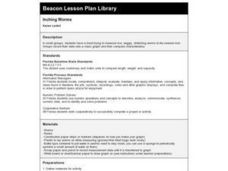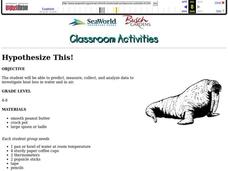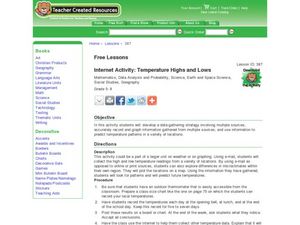Curated OER
Population Density
Students use the scientific method to conduct an experiment and use varied methods to gather background information. They correctly use lab equipment and prepare tables and graphs that organize, conclude, and present their findings. ...
Curated OER
Different Perspectives of Oregon's Forest Economic Geography
Pupils map data on employment in wood products manufacturing in Oregon counties. In this Oregon forest activity, students discover the percentage of people employed in the forest manufacturing industry. Pupils create a box and whisker...
Curated OER
Living in Extreme Environments
High schoolers examine the characteristics of the ocean floor and the importance of of extreme environments. In this investigative lesson students use four methods to sample populations, gather, record and analyze data from a...
Curated OER
Clouds and the Weather
Fourth graders analyze the relationship of clouds and local weather. Students also observe and record cloud data and weather conditions daily as they research different cloud types. The data is analyzed looking for trends in daily...
Curated OER
Ocean Botttom Profile
Learners interpret a graph of ocean depths and topographic features. This task assesses students' abilities to interpret figures, organize and represent data, apply knowledge of scale to a profile, and apply theoretical knowledge.
Curated OER
Systems of the Body
Third graders gather information by questioning, forming hypothesis, collecting and analyzing data, reaching conclusions and evaluating results, and communicating procedures and findings to others. Then they demonstrate an understanding...
Curated OER
Heating Crystals
Students examine the effects of heating on various crystals. They answer questions in the observation category which assess their ability to use a variety of senses to observe data in a certain way- a scientific way.
Curated OER
Marine Protected Areas
Students design a research project about a Marine Protected Area they chose. In this marine biology lesson, students gather fish count and catch data then graph them. They create an information poster about their findings.
Curated OER
Coastal Weather Issues: Planning for a Hurricane
Seventh graders utilize internet resources to gather, analyze, and interpret hurricane data. They develop a public information booklet that be used as a guide for the community to use when preparing for a hurricane.
Curated OER
Hlf-Ball
Students investigate Newton's Laws of Motion and the Law of Conservation of Energy. They examine how a ball and half-ball behave and relate these laws to what happens to the ball. Students produce a graph of the data collected and...
Curated OER
How Strong Is It?
Students investigate the adhesion conditions and surface for using post it notes. In this post it notes lesson plan, students discover the adhesive properties, test the notes for strength, and interpret data and draw conclusions.
Curated OER
Weather the Storm
Fourth graders complete multi-curricular activities for weather. For this weather lesson, 4th graders complete creative writing, research, and weather data analysis activities for the lesson.
Curated OER
What's Your Favorite Color?
Young scholars investigate the psychology behind color choices using two sites on the Internet. They complete a worksheet and construct an Inspiration file with the data from the charts. Then they form a hypothesis and test it using the...
Curated OER
Alzheimer's Disease
Investigate Alzheimer's disease. Conduct research using a variety of resources, obtain information, and input the data into a Microsoft Excel spreadsheet. Identify trends in the data and categorize them for an audience.
Curated OER
Human Populations Studies: the Ghost of Populations Past
Students compile data on population distribution and develop survivorship curves using information from cemetery tombstones and obituaries. They develop inferences on the changes in population age distribution in their area over time.
Curated OER
Density of a Sinker
Eighth graders determine the density of a sinker by first finding the mass and then the volume using a graduated cylinder. Students must write the procedure they use to find the volume of the sinker then apply their data to follow-up...
Curated OER
How Do You Define Spring?
Students conduct surveys to determine when spring occurs in the minds of people in their area. They organize and interpret their data.
Curated OER
Inching Worms
Third graders have a blast trying to measure live, wiggly, stretching worms to the nearest inch. Groups record their data onto a class graph and then compare characteristics. They share their findings with the rest of the class. Fun lesson!
Curated OER
How Does a Migration Move Forward?
Students record and examine migration data, and calculate how fast and far a migrating animal travels and what influences its progression. They utilize the Journey North website to follow their migrating animals.
Curated OER
HYPOTHESIZE THIS!
Students predict, measure, collect, and analyze data to investigate heat loss in water and in air.
Curated OER
Who's Got Your Power
Students examine and map local sources of energy. They conduct Internet research on their local utility company, identify where their utility company obtains energy, graph the data, and label a map of power plant locations in their state.
Curated OER
Compare and Contrast Culture
Fifth graders compare and contrast the cultures of American culture with that of the other cultures of North America. Using traditional and Internet research, 5th graders gather data on one element of culture for comparison. Data...
Curated OER
Temperature High and Lows
Young scholars gather high and low temperature readings through email. In this temperature graphing lesson, students use a spreadsheet to input data for a graph. young scholars interpret the graphs to compare and contrast the data from...
Curated OER
Plants 'n' Bugs
Second graders experiment to find if pollinators have color preferences. In this plant and bug instructional activity, 2nd graders gather information about how flowers pollinate. Students participate in a pollination...























